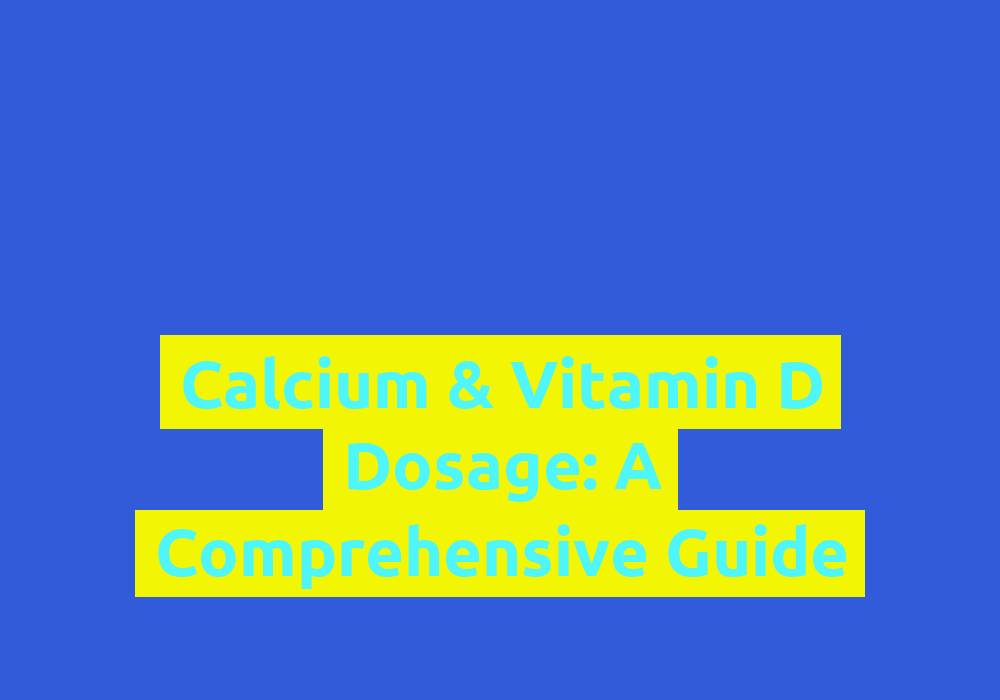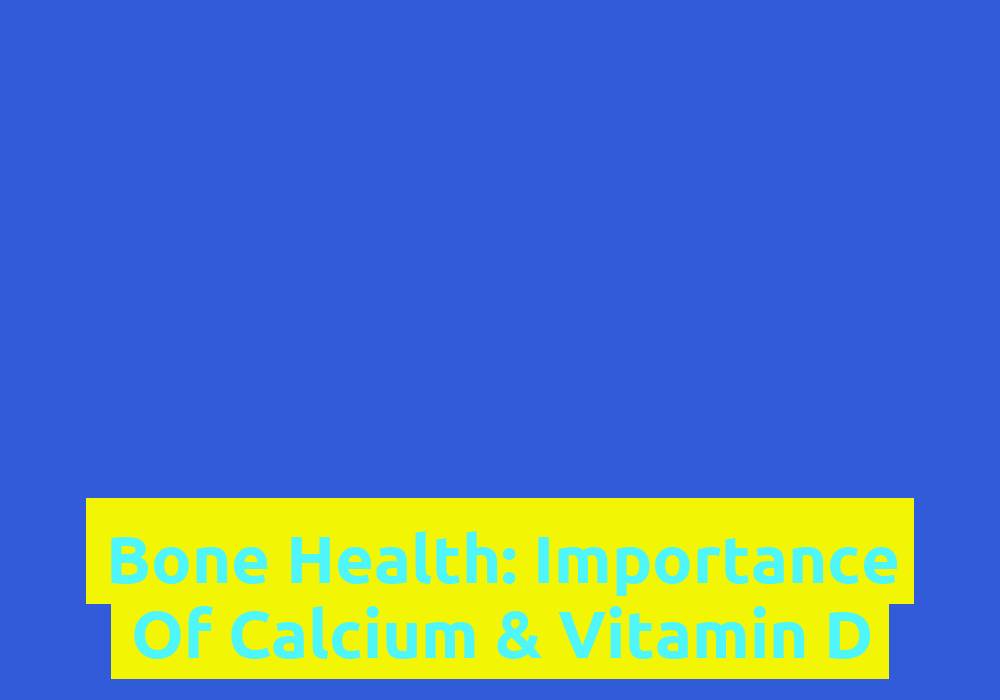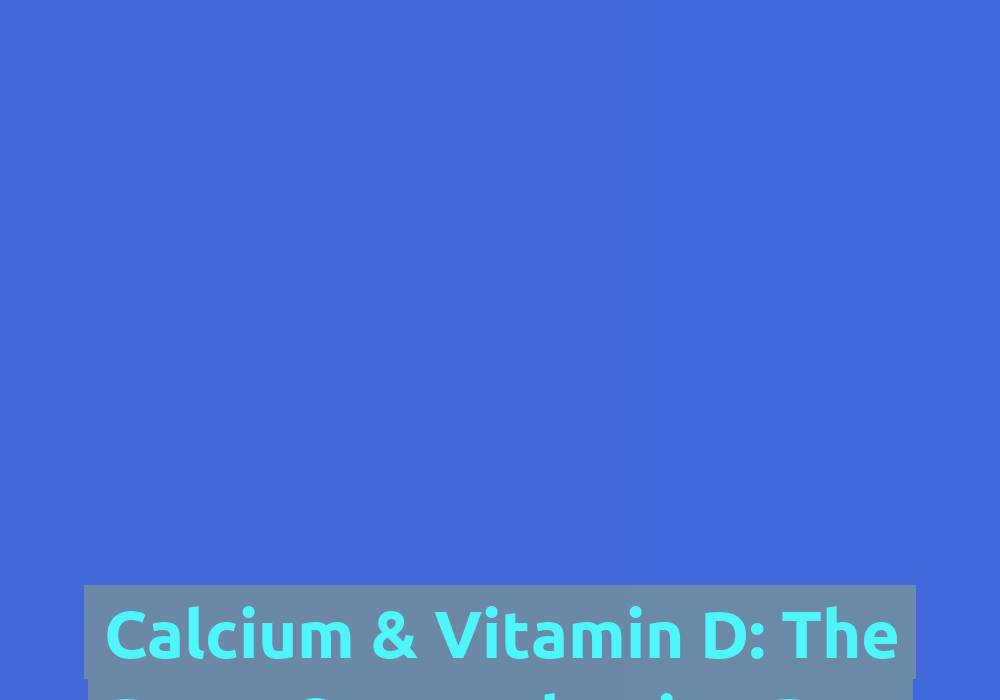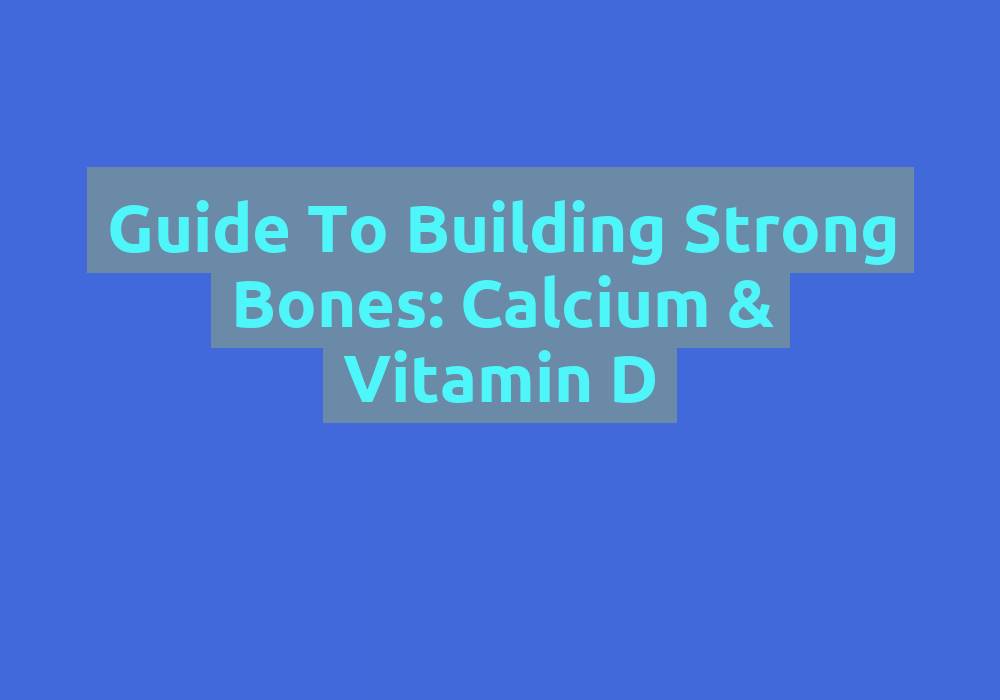Dosage Guidelines: Balancing Calcium & Vitamin D

When it comes to maintaining optimal health and well-being, ensuring a proper balance of calcium and vitamin D intake is essential. These two nutrients play crucial roles in supporting various bodily functions, including bone health, immune system function, and nerve signaling. However, determining the right dosage for each can be a bit challenging. In this article, we will dive into the dosage guidelines for calcium and vitamin D, helping you achieve the perfect balance.
Understanding the Importance of Calcium and Vitamin D
Before delving into the dosage guidelines, let’s first understand why calcium and vitamin D are vital for our bodies.
Calcium
Calcium is an essential mineral that plays a crucial role in maintaining strong and healthy bones. It is also involved in muscle function, nerve transmission, and hormone secretion. In addition to supporting bone health, calcium helps regulate blood pressure and prevent conditions like osteoporosis.
Calcium is not only important for bone health but also for several other bodily functions. It aids in muscle contraction, including the heartbeat, and helps with nerve transmission, ensuring proper communication between the brain and the body. Calcium also plays a role in hormone secretion, helping to regulate various physiological processes. Additionally, this mineral is involved in blood clotting, enabling wounds to heal properly.
Vitamin D
Vitamin D, often referred to as the sunshine vitamin, is a fat-soluble vitamin that our bodies produce when exposed to sunlight. It aids in the absorption of calcium from the intestines and promotes its utilization in bone formation. Besides its role in bone health, vitamin D also supports immune system function, reduces inflammation, and may even contribute to cardiovascular health.
Vitamin D is not naturally present in many foods, which is why sunlight exposure is crucial for its production in the body. This vitamin helps regulate the absorption of calcium and phosphorus, ensuring that they can be properly utilized for bone health. Additionally, vitamin D has immune-modulating effects, meaning it can help regulate the immune system and reduce the risk of autoimmune diseases. It also plays a role in reducing inflammation and supporting cardiovascular health.
Recommended Daily Intake
The recommended daily intake (RDI) for calcium and vitamin D can vary depending on age, sex, and individual health conditions. The following guidelines will help you understand the general dosage recommendations:
Calcium Dosage Guidelines
- Adults (19-50 years): The RDI for adults in this age group is approximately 1000 mg per day. However, this can vary based on factors such as pregnancy or lactation.
- Adults (51 years and older): The RDI increases to around 1200 mg per day for adults over the age of 50. This higher dosage is necessary due to the natural decline in bone density that occurs with age.
- Children (1-18 years): The calcium requirements for children vary depending on their age. Here are some general guidelines:
- 1-3 years: 700 mg/day
- 4-8 years: 1000 mg/day
- 9-18 years: 1300 mg/day
Calcium requirements vary depending on age and life stage. For adults between the ages of 19 and 50, the recommended daily intake is around 1000 mg. However, this dosage may differ for pregnant or lactating women due to increased calcium needs during these periods. As individuals age and bone density naturally declines, adults aged 51 and older are advised to increase their calcium intake to approximately 1200 mg per day. For children, the recommended daily intake ranges from 700 mg for ages 1-3, 1000 mg for ages 4-8, and 1300 mg for ages 9-18. It is essential to ensure that children consume an adequate amount of calcium to support their growing bones and overall development.
Vitamin D Dosage Guidelines
- Adults (19-70 years): The general RDI for vitamin D is 600 IU (international units) per day.
- Adults (71 years and older): The RDI increases to 800 IU per day.
- Children (1-18 years): The recommended dosage for children is between 400-600 IU per day.
The recommended daily intake of vitamin D varies based on age as well. For adults between the ages of 19 and 70, the general RDI is 600 IU (international units) per day. As individuals age, the RDI for vitamin D increases to 800 IU per day for adults aged 71 and older. Children, on the other hand, require a lower dosage of vitamin D, ranging from 400 to 600 IU per day. It is important to note that these dosages serve as a starting point, and individual needs may vary. Consulting with a healthcare professional can help determine the specific requirements for each individual.
It is important to note that these guidelines serve as a starting point, and individual needs may vary. It is always best to consult with a healthcare professional to determine your specific requirements.
Balancing Calcium and Vitamin D Intake
Achieving the right balance between calcium and vitamin D intake is crucial for optimal health, as vitamin D enhances the absorption of calcium. Here are some strategies to help you maintain this balance:
1. Natural Sunlight Exposure
One of the best ways to increase your vitamin D levels is through natural sunlight exposure. Spending approximately 10-30 minutes in the sun, a few times a week, can help your body produce adequate amounts of vitamin D. However, it is important to practice sun safety and avoid prolonged exposure, especially during peak hours.
Natural sunlight exposure is the most effective way to boost vitamin D levels in the body. Spending time outdoors, particularly during the midday when the sun’s rays are the strongest, can stimulate the production of vitamin D in the skin. It is recommended to expose your face, arms, and legs to sunlight for about 10-30 minutes a few times a week. However, it is crucial to be mindful of sun safety practices, such as wearing sunscreen and protective clothing, to prevent sunburn and reduce the risk of skin damage.
2. Dietary Sources of Calcium
Incorporating calcium-rich foods into your diet is essential for maintaining healthy calcium levels. Some excellent dietary sources of calcium include dairy products (milk, cheese, yogurt), leafy green vegetables (spinach, kale), and fortified foods (cereals, juices).
To ensure an adequate calcium intake, it is important to include calcium-rich foods in your diet. Dairy products such as milk, cheese, and yogurt are excellent sources of calcium. Leafy green vegetables like spinach and kale also provide a significant amount of calcium. Additionally, fortified foods such as cereals and juices can be good sources of calcium, especially for individuals with dietary restrictions or preferences. Including a variety of these calcium-rich foods in your meals can help meet your daily calcium requirements.
3. Dietary Sources of Vitamin D
While sunlight is a primary source of vitamin D, it can also be obtained through certain foods. Fatty fish like salmon and mackerel, egg yolks, and fortified dairy products are good sources of vitamin D. Including these foods in your diet can help ensure you meet your daily requirements.
In addition to sunlight exposure, incorporating foods that are rich in vitamin D into your diet is important. Fatty fish, such as salmon and mackerel, are excellent sources of vitamin D. Egg yolks and fortified dairy products also contribute to vitamin D intake. By including these foods in your meals, you can help meet your daily vitamin D requirements.
4. Supplements
In some cases, meeting the recommended dosage through diet alone may be challenging. In such instances, supplements can be a helpful option. Calcium and vitamin D supplements are widely available and can be taken under the guidance of a healthcare professional. It is important not to exceed the recommended dosage without consulting a healthcare provider.
While a balanced diet and sunlight exposure are the preferred methods for meeting calcium and vitamin D requirements, supplements can be beneficial in certain situations. If it is difficult to obtain sufficient amounts of calcium and vitamin D through diet alone or if there are specific health concerns, supplements can help bridge the gap. However, it is crucial to consult with a healthcare professional before starting any supplementation and to follow the recommended dosage. Taking excessive amounts of calcium or vitamin D can have adverse effects on health, so it is important to be cautious and seek professional guidance.
Conclusion
Maintaining a proper balance of calcium and vitamin D intake is essential for overall health and well-being. The recommended daily intake for calcium and vitamin D varies based on age and individual circumstances. By following the dosage guidelines and incorporating calcium and vitamin D-rich foods into your diet, you can ensure you provide your body with the necessary nutrients for optimal function. Remember to consult a healthcare professional for personalized advice, especially if you have specific health conditions or concerns.
In conclusion, achieving the right balance of calcium and vitamin D is crucial for supporting various bodily functions and maintaining optimal health. Understanding the importance of these nutrients, following the recommended daily intake guidelines, and implementing strategies such as natural sunlight exposure, incorporating calcium and vitamin D-rich foods into your diet, and considering supplements when necessary can help you achieve the desired balance. Prioritizing your health and seeking professional guidance are key in optimizing your calcium and vitamin D intake.
FAQ
Q1: What is the recommended daily intake of calcium for adults aged 19-50?
A1: The recommended daily intake of calcium for adults aged 19-50 is approximately 1000 mg per day.
Q2: How much calcium should adults aged 51 and older consume daily?
A2: Adults aged 51 and older should consume approximately 1200 mg of calcium per day.
Q3: What is the recommended daily intake of vitamin D for adults aged 19-70?
A3: The recommended daily intake of vitamin D for adults aged 19-70 is 600 IU (international units) per day.
Q4: How much vitamin D should children consume daily?
A4: Children should consume between 400-600 IU of vitamin D per day.







